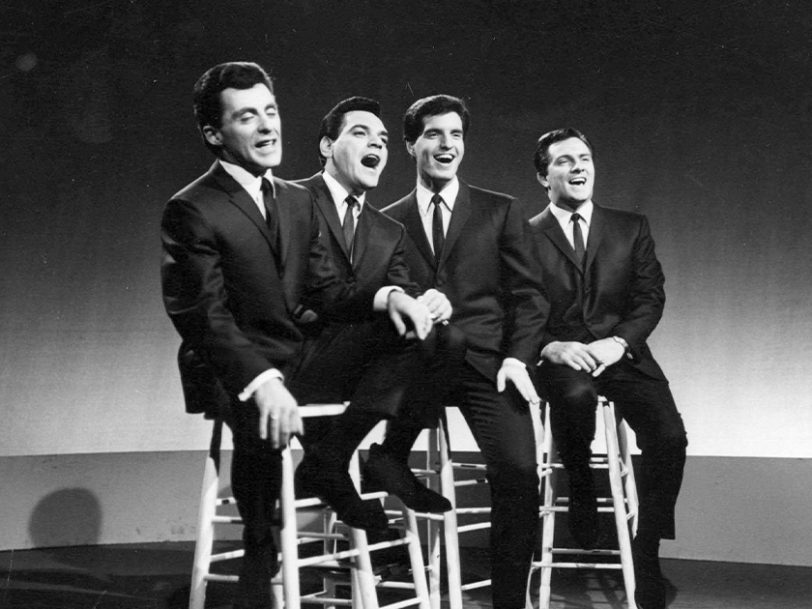“You know, my whole life has been music,” Frankie Valli said in 2016. “I don’t play golf. I don’t play tennis. I don’t hike. I don’t ski. If I could do all music, all day long for my whole life, that would be the ultimate for me.” The music of Valli and his group, The Four Seasons, has been classy, catchy, soulful, jazzy and, above all, enduring. Valli’s work now spans eight decades, and has responded to changing trends while retaining its pure heart – that of Valli’s incredible voice. As he has put it, “I just thought anybody who had a voice could do anything they wanted with that voice.”
Listen to the best of Frankie Valli And The Four Seasons here.
Tough beginnings: New Jersey boys
Frankie Valli was born Francesco Castelluccio in 1934, and grew up poor in blue-collar Newark, New Jersey. Close enough to New York City to smell its excitement, but far enough away to yearn for its untouchable glamour, Valli felt this contradiction keenly. “It’s the dream of becoming successful,” he reflected in 2023. “It’s, ‘How do I get out of here? How do I take this step to this plateau since no one is sending me to college? What am I going to do with my life? Am I going to work in a factory for my whole life? Am I gonna get a job with the mob picking up numbers? Or am I gonna go and get involved with various crimes? What am I going to do?’”
Valli’s family were on the edges of the mafia, with Valli describing Angelo “Gyp” DeCarlo – a high-ranking mobster – as “like an uncle”. Yet while the mob was part of the background noise in his Italian American community, Valli’s powerful falsetto and early, deep interest in music drew him away from trouble. “I was barely a teen,” Valli has said, of discovering his voice. “I thought everyone could sing falsetto! People’s reaction of wonderment and their comments made me realise how special it was.” He started studying singers. At the age of seven, Valli saw Sinatra perform; he also loved jazz, and particularly became entranced by The Four Freshman (a vocal quartet also beloved of Brian Wilson).
- Best Frankie Valli And The Four Seasons Songs: 10 Jersey Boys Classics
- Best 60s Songs: 20 Stone-Cold Classics From Pop’s Golden Decade
- Best Soul Singers: 30 Must-Hear Voices From Soul Music’s Golden Era
But it was to be a woman, the singer “Texas” Jean Valli, who held the most immediate influence on him. She was a commanding yodeller, writing and performing her own songs, accompanying herself with bass fiddle and guitar. She took the young man under her wing, and introduced him to her music-business contacts as her brother – and his stage name, Valli, stuck.
The influence of a strong female artist so early on in his career gave Frankie Valli a unique quality among his peers. His music is not aggressively masculine, and never thoughtless about women’s viewpoints (in 2018, he praised the #MeToo movement). His falsetto, for which he is so famous, grooves and gyrates beyond gender binaries.
Becoming The Four Seasons
Frankie Valli’s first single, a cover of Georgie Jessel’s My Mother’s Eyes, was released in 1953, but it wasn’t until he joined up with Tommy DeVito, Nick Massi and Bob Gaudio that his career solidified. Evolving from a band called The Four Lovers, The Four Seasons met the mood of the early 60s with hits such as Sherry, Big Girls Don’t Cry and Walk Like A Man. All were enormously successful – fresh, young, yet stunningly accomplished.




